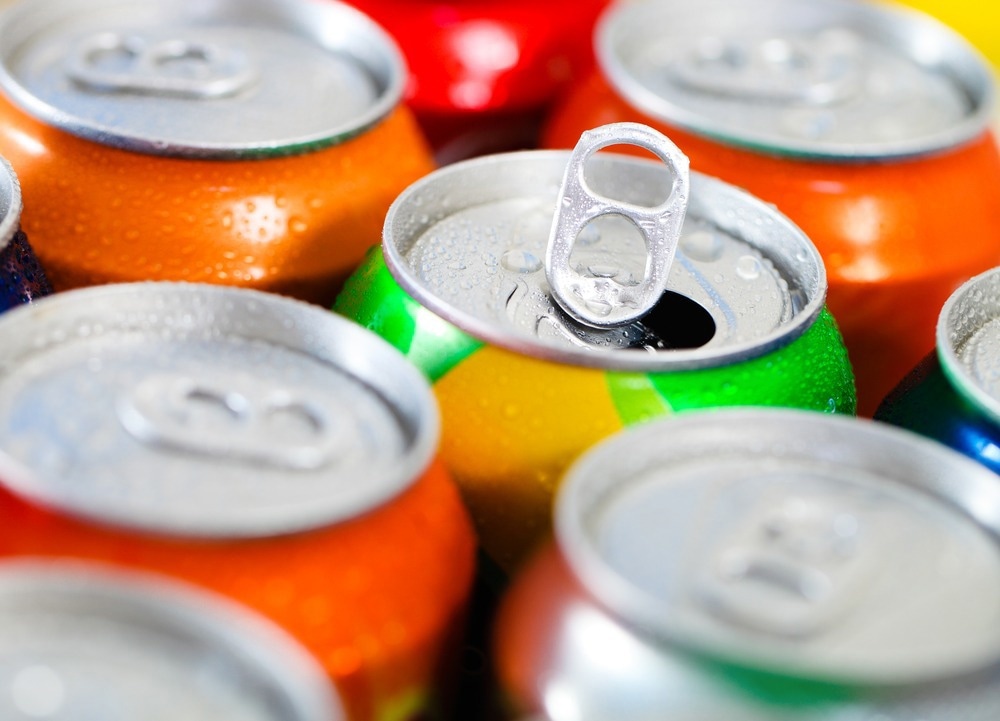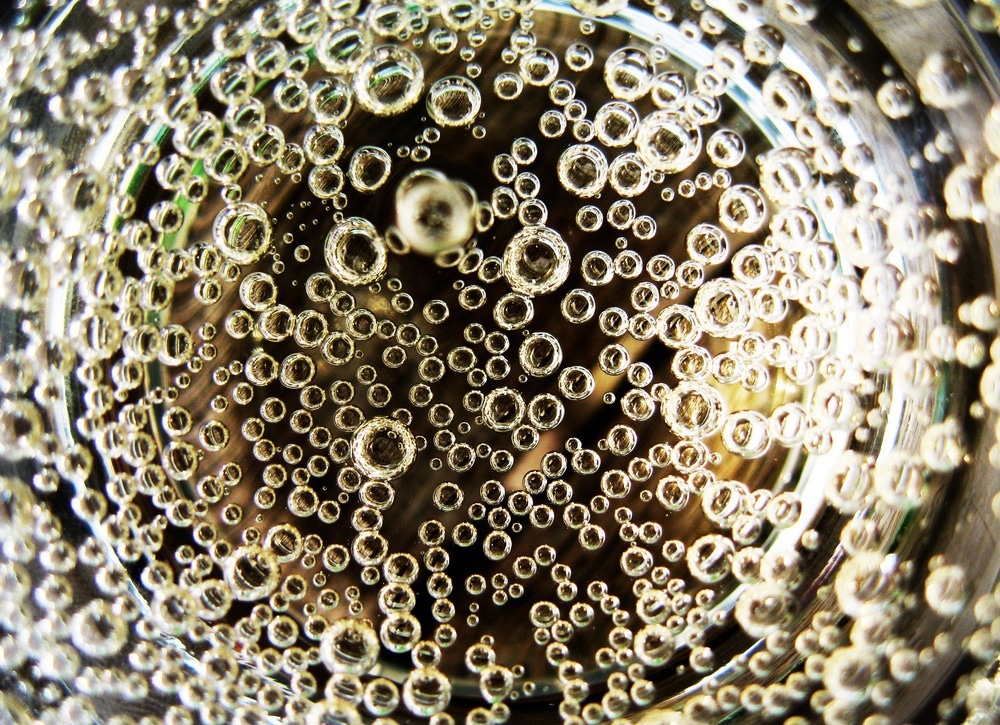Carbonation plays a pivotal role during the processing of soft drinks, influencing their taste and texture. However, keeping the perfect acidity level in every bottle can be challenging and must be done carefully. It is here that carbonation sensors come into play.

Image Credit: Dasha Petrenko/Shutterstock.com
An Overview of the Carbonation Mechanism
Carbonation involves the intricate phenomenon of infusing a liquid with carbon dioxide (CO2), accomplished by exerting a high pressure. When subjected to elevated pressure, the liquid accommodates a greater quantity of carbon dioxide molecules.
Because of this, the process of carbonation is frequently conducted within sealed / pressurized vessels or tanks. Upon the application of pressure, the carbon dioxide (CO2) comes into contact with the aqueous medium, leading to its dissolution.
The phenomenon of carbonation is attributed to the release of pressure. Upon unsealing the container or transferring the beverage into a container, the pressure within the system is relieved.
This leads to the discharge of carbon dioxide (CO2) from its dissolved state, manifesting as effervescent bubbles. The release of gaseous substances stimulates the pleasurable phenomenon of effervescence, which is commonly correlated with carbonated beverages. Carbonic acid is the chemical compound responsible for imparting the distinctive fizziness and generating the delectable bubbles commonly observed in delicious soft drinks.
How Do Carbonated Sensors Work?
Modern carbonation sensors are ingeniously designed to measure and manage the exact amount of carbon dioxide passing through soft drinks. These sensors are crucial for maintaining the perfect carbonation balance for each beverage. Carbonation sensors carry out their functions expertly by combining pressure and temperature measurements, solubility coefficients, and the ideal integration of real-time feedback systems.
Carbonation sensors constantly monitor pressure, temperature, and liquid composition in complex manufacturing and packaging processes. These factors directly affect CO2 solubility in liquids. The constant monitoring of such parameters by carbonated sensors is essential for maintaining consistency. With the accurate use of solubility coefficients, carbonation sensors can calculate and manage the exact amount of carbon dioxide needed to reach the highest carbonation level.
In soft drinks manufacturing, real-time feedback methods involving carbonation sensors are important. These systems provide continuous data, allowing for quick and accurate modifications to maintain uniformity.
The feedback sensing systems immediately detect beverage CO2 levels, allowing for quick changes. Thus, the real-time feedback system is critical for maintaining industry and health standard-compliant carbonation quality and consistency.
Investigations have recently attempted to implement automated sensing systems for soft drink manufacturing. Automated systems with integrated chip-based sensors can precisely control pressure and temperature to ensure a specific level of CO2 in the soft drinks.

Image Credit: Alex Freiburg/Shutterstock.com
Carbonation Sensors: Optimizing Quality Control in the Commercial Soft Drink Sector
Maintaining the quality of soft drinks depends on the accuracy and precision of carbonation sensors. The taste and mouth feel of the beverage can be influenced by even the slightest deviations from the desired carbonation level. Manufacturers can maintain stringent quality control requirements since these sensors are designed to provide high levels of accuracy. Utilizing cutting-edge technology guarantees that every soft drink can or bottle fulfills the brand's quality criteria.
Consistency is essential in the soft drink industry. Customers want the same flavor and fizz in every canned or bottled soft drink they consume. Carbonation sensors are critical to achieving this level of uniformity. These modern sensors ensure fizziness, taste, and constituent concentration are uniform in all the batches, hence maintaining the brand's reputation for quality. Variations in carbonation levels would result in unsatisfied consumers and a degraded brand image if these sensors were not there.
Efficiency and Cost Saving
Real-time monitoring using carbonation sensors improves product quality while increasing efficiency and lowering costs. The intricate manufacturing process optimized by these sensors leads to very little waste material while also ensuring there are no batch recalls owing to bad quality. It is not only advantageous in terms of cost reduction but also adds to sustainability initiatives by decreasing resource utilization and lowering the environmental effects of soft drink production.
Market Dynamics
The carbonated beverage sector is expanding rapidly and also points towards a major boost in the carbonation sensor technology. Precedence Research has conducted thorough research that forecasts the carbonated drinks industry to be valued at around 654.37 billion by the end of 2032.
North America dominated the global carbonated drinks sector in 2022. Just like all industries, this sector is also aiming towards sustainability, with eco-friendly packaging becoming the center of attention.
Additionally, soft drink companies are investing in cutting-edge sensor technologies as quality control and efficiency become increasingly critical. Sensor manufacturers are constantly aiming towards even more efficient sensors with innovative technology to fulfill the needs of the beverage industry. Consumer demands for consistently high-quality soft drinks are driving the changing market environment.
Case Study
PepsiCo, a renowned company in the realm of soft drink manufacturing, has ingeniously planned to decrease the sugar concentration in soft drinks while maintaining carbonation levels by employing carbonated sensors. The plan is to achieve a 50% sugar reduction along with offering the customers a variety of choices in terms of carbonation/fizziness.
Through the integration of cutting-edge carbonation sensors, PepsiCo will offer a range of soft drinks with reduced sugar levels, each having its specific carbonation level.
Carbonation sensors are the unsung heroes of the soft drink industry. Carbonation sensors are more than just technological wonders; they form the foundation of the soft drink industry's quality control, efficiency, and cost savings. Future developments are projected to involve increased accuracy, automation, and data analytics integration.
The integration of technologies such as the Internet of Things and modern electronics will surely boost the efficiency of such sensors. These advancements will improve product quality, manufacturing efficiency, and sustainability in the beverage industry.
References and Further Reading
Askew, K. (2021). PepsiCo talks health and reformulation across drinks and snacks: ‘The key is to get a product that consumers choose because it tastes great’. [Online]
Available at: https://www.foodnavigator.com/Article/2021/07/02/PepsiCo-talks-health-and-reformulation-across-drinks-and-snacks-The-key-is-to-get-a-product-that-consumers-choose-because-it-tastes-great [Accessed 02 November 2023].
Britannica (2023). Carbonation in Beverage Production. [Online] Available at: https://www.britannica.com/science/carbonation [Accessed 28 October 2023].
Chaudhary, V. (2018). Soft Carbonated Beverages. In: Beverages Processing and Technology. Rajasthan: Scientific Publishers, pp. 90-111. Available at: https://www.researchgate.net/publication/353014026_Soft_Carbonated_Beverages
Crowder, M. (2023). The bubbly chemistry behind carbonated beverages. [Online] Available at: https://theconversation.com/the-bubbly-chemistry-behind-carbonated-beverages-210111 [Accessed 1 November 2023].
Cyndi (2023). Carbon Dioxide & Nitrogen Play Important Roles in Craft Beverage Production. [Online] Available at: https://beverage-master.com/2023/05/carbon-dioxide-nitrogen-play-important-roles-in-craft-beverage-production/ [Accessed 2 November 2023].
Kelly Pneumatics (2023). CO2 Injection In The Carbonated Beverage Manufacturing Process. [Online] Available at: https://kellypneumatics.com/c02-injection-in-the-carbonated-beverage-manufacturing-process/ [Accessed 2 November 2023].
Precedence Research (2023). Carbonated Beverage Market - Global Industry Analysis, Size, Share, Growth, Trends, Regional Outlook, and Forecast 2023-2032. [Online]
Available at: https://www.precedenceresearch.com/carbonated-beverage-market [Accessed 1 November 2023].
Disclaimer: The views expressed here are those of the author expressed in their private capacity and do not necessarily represent the views of AZoM.com Limited T/A AZoNetwork the owner and operator of this website. This disclaimer forms part of the Terms and conditions of use of this website.